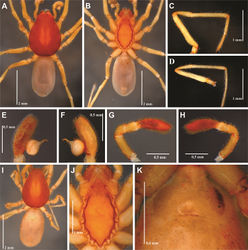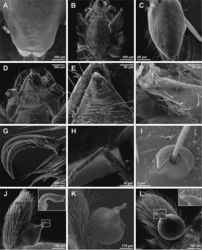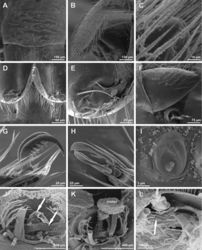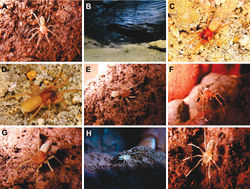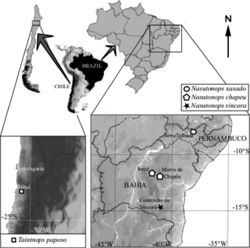Carajas paraua
| Notice: | This page is derived from the original publication listed below, whose author(s) should always be credited. Further contributors may edit and improve the content of this page and, consequently, need to be credited as well (see page history). Any assessment of factual correctness requires a careful review of the original article as well as of subsequent contributions.
If you are uncertain whether your planned contribution is correct or not, we suggest that you use the associated discussion page instead of editing the page directly. This page should be cited as follows (rationale):
Citation formats to copy and paste
BibTeX: @article{Brescovit2016ZooKeys, RIS/ Endnote: TY - JOUR Wikipedia/ Citizendium: <ref name="Brescovit2016ZooKeys">{{Citation See also the citation download page at the journal. |
Ordo: Araneae
Familia: Caponiidae
Genus: Carajas
Name
Carajas paraua Brescovit & Sánchez-Ruiz, 2016 sp. n. – Wikispecies link – ZooBank link – Pensoft Profile
Types
Male holotype and female allotype from Gruta N5S8 (06°06'29"S, 50°07'57"W), Flona de Carajás, Parauapebas, Pará, Brazil, 7-12.X.2008, R. Andrade, deposited in IBSP 191287.
Etymology
The specific name is a noun in apposition taken from the Brazilian Tupi Indian language that means parrot (‘’Papagaio’’ in Portuguese) and refers to this common bird in the region of Parauapebas.
Diagnosis
With the characters of the genus and genitalia as above described.
Description
Male (holotype). Total length 4.2. Carapace 2.1 long, 1.5 wide. Coloration: cephalothorax uniformly orange-reddish, except border of sternum brown. Legs and palps yellow. Abdomen uniformly grayish. Leg measurements: I: femur 1.8/ patella 1.0/ tibia 1.4/ metatarsus 1.1/ tarsus 1.0/ total 6.3; II: 1.6/ 1.0/ 1.4/ 1.0/ 0.9/ 5.9; III: 1.5/ 0.7/ 1.1/ 1.0/ 0.8/ 4.1; IV: 2.0/ 1.0/ 2.1/ 1.3/ 1.0/ 7.4. Palp as in figures 13D–E, 14J–L and 16A–C.
Female (allotype). Total length 4.3. Carapace 2.1 long, 1.5 wide. Coloration as in male. Leg measurements: I: femur .1.3/ patella 0.7/ tibia 1.1/ metatarsus 0.7/ tarsus 0.6/ total 4.4; II: 1.1/ 0.6/ 0.9/ 0.7/ 0.6/ 3.9; III: 1.0/ 0.6/ 0.8/ 0.7/ 0.5/ 3.6; IV: 1.4/ 0.8/ 1.4/ 0.9/ 0.7/ 5.2. Internal genitalia as described for the genus (Fig. 16D).
Other material examined
BRASIL. Pará: Parauapebas, Flona de Carajás, Cave N1-15 (06°02'03"S, 50°16'17"W), Magangá, 2♀ 1imm., 28/IX-30/X/2007, R. Andrade col. (IBSP 97871); Cave N1-37 (06°01'51"S, 50°16'29"W), Bial, 1♀ 2imm., 28/IX-30/X/2007, R. Andrade col. (IBSP 97870); Cave N4E-08 (06°02'20"S, 50°09'36"W), 2 imm., 20/IV-04/V/2010, C.A.R. Souza col. (IBSP 191216); Cave N4E-15 (06°02'09"S, 50°09'35"W), 1♂ 1♀ 9imm., 20/IV-04/V/2010, D. B. Pedroso, D. Bebiano & I. Cizauskas col. (IBSP 191217-191220); Cave N4E-18 (06°02'02"S, 50°10'03"W), 2imm., 20/IV-04/V/2010, J. Mascarenhas (IBSP 191221); Cave N4E-22 (06°02'14"S, 50°10'02"W), 3♀ 4 imm., 20/X-04/V/10, R. Andrade, C.A.R. Souza & D. B. Pedroso (IBSP 97834; IBSP 191222-191223); Cave N4E-26 (06°02'24"S, 50°09'39"W), 1 imm., 18/VIII-03/IX/2009, I. Cizauskas (IBSP 191224); Cave N4E-31 (06°02'26"S, 50°09'36"W), 1 imm., 18/VIII-03/IX/2009, D. Bebiano (IBSP 191225); Cave N4E-33 (06°01'58"S, 50°09'38"W), 1♂ 1♀, 15-22/IX/2009, I. Cizauskas (IBSP 191226); Cave N4E-33 (06°01'58"S, 50°09'38"W), 3 imm., 15-22/IX/2009, D. B. Pedroso & I. Cizauskas (IBSP 191227-191228); Cave N4E-39 (06°02'22"S, 50°09'38"W), 1 imm., 19/II-04/III/2010, D. B. Pedroso (IBSP 191229); Cave N4E-51 (06°02'00"S, 50°09'12"W), 1 imm., 19/II-04/III/2010, D. Mello (IBSP 191230); Cave N4E-62 (06°01'57"S, 50°09'04"W), 2♀ 1imm., 19/II-04/III/2010, D. B. Pedroso & J. Mascarenhas (IBSP 191231-191232); Cave N4E-65 (06°01'54"S, 50°09'02"W), 1 imm., 24-30/VII/2009, D. Mello (IBSP 191233); Cave N4E-68 (06°01'56"S, 50°09'13"W), 1 imm., 19/II-04/III/2010, C.A.R. Souza (IBSP 191234); Cave N4E-73 (06°01'58"S, 50°09'20"W), 1♂ 2♀ 2 imm., 24-30/VII/2009-04/III/2010, D. Bebiano, J.B. Verdiani & R. Andrade (IBSP 191235-191237); Cave N4E-74 (06°01'57"S, 50°09'02"W), 1imm., 19/II-04/III/2010, I. Cizauskas (IBSP 191238); Cave N4E-77 (06°01'58"S, 50°09'04"W), 11 imm., 24/VII/2009-04/III/2010, I. Cizauskas, D. B. Pedroso & J. Mascarenhas (IBSP 191239-191242); Cave N4E-80 (06°01'58"S, 50°09'21"W), 2 imm., 24/VII/2009-04/III/2010, I. Cizauskas & D. B. Pedroso (IBSP 191243-191244); Cave N4E-82 (06°02'00"S, 50°09'13"W), 1♀, 24-30/VII/2009, D. B. Pedroso (IBSP 191245); Cave N4E-84 (06°02'05"S, 50°09'37"W), 1 imm., 24-30/VII/2009, R. Andrade (IBSP 191246); Cave N4WS-04 (06°04'21"S, 50°11'42"W), 1 imm., 18/XI-01/XII/2010, L. Tunes col. (IBSP 191247); Cave N4WS-04 (06°04'21"S, 50°11'42"W), 2 imm., 10-19/V/2011, I. Cizauskas (IBSP 191248-191249); Cave N4WS-15 (06°03'57"S, 50°11'20"W), 2 imm., 20/IV-04/V/2010, C.A.R. Souza & D.B. Pedroso (IBSP 191250-191251); Cave N4WS-18 (06°04'01"S, 50°11'37"W), 1 imm., 18/XI-01/XII/2010, C.A.R. Souza (IBSP 191252); Cave N4WS-47 (06°04'34"S, 50°11'39"W), 1 imm., 18/XI-01/XII/2010, C.A.R. Souza (IBSP 191253); Cave N4WS-67 (06°04'21"S, 50°11'29"W), 1♀ 14 imm., 18/XI/2010-19/V/2011, V. Felice et al. (IBSP 191254-191259); Cave N4WS-73 (06°04'24"S, 50°11'37"W), 2 imm., 18/XI-01/XII/2010, V. Felice & C.A.R. Souza (IBSP 191260-191261); Cave N5S-03 (06°06'18"S, 50°08'04"W), 2♀, 14-23/X/2009, I. Cizauskas (IBSP 161138); Cave N5S-04 (06°06'19"S, 50°08'02"W), 1♂ 3♀ 10 imm., 14-23/X/2009, D.B. Pedroso & I. Cizauskas (IBSP 161140, IBSP 161189, IBSP 161191); Cave N5S-07 (06°06'20"S, 50°07'59"W), 1♀ 9 imm., 14-23/X/2009, I. Cizauskas, D.B. Pedroso & J.B. Verdiani (IBSP 161158, IBSP 161161, IBSP 161179, IBSP161182); Cave N5S-08 (06°06'20"S, 50°07'56"W), 4♂ 16♀ 49 imm., 7/X/2008-23/X/2009, R. Andrade, I. Cizauskas & J.B. Verdiani (IBSP 191262-191265, IBSP 161106, IBSP 161120, IBSP 161130, IBSP 161141, IBSP 161149, IBSP 161166, IBSP 161184; 1♂ 1♀ for SEM); Cave N5S-09 (06°06'21"S, 50°07'52"W), 1♂ 13♀ 14 imm., 14-23/X/2009, D. B. Pedroso, I. Cizauskas & J.B. Verdiani (IBSP 161108, IBSP 161127, IBSP 161133, IBSP 161215, IBSP 161226 IBSP 161231, IBSP 161233, IBSP 191266); Cave N5S-10 (06°06'20"S, 50°07'53"W), 9♀ 11 imm., 7/X/2008-23/X/2009, R. Andrade et al. (IBSP 161114, IBSP 161116, IBSP 161148, IBSP 161152, IBSP 161209-161210, IBSP 191267-191268); Cave N5S-11 (06°06'17"S, 50°07'46"W), 5♀, 14-23/X/2009, D. B. Pedroso (IBSP 161175); Cave N5S-13 (06°06'19"S, 50°08'01"W), 2♀ 5 imm., 14-23/X/2009, D. B. Pedroso & I. Cizauskas (IBSP 161113, IBSP 161154); Cave N5S-14 (06°06'19"S, 50°08'00"W), 2♂ 8♀ 12 imm., 14-23/X/2009, D. B. Pedroso & I. Cizauskas (IBSP 161132, IBSP 161203, IBSP 161218, IBSP 191269); Cave N5S-20 (06°05'15"S, 50°07'35"W), 2 imm., 25/VIII-03/IX/2009, I. Cizauskas & J.B. Verdiani (IBSP 161206, IBSP 161208); Cave N5S-21 (06°05'15"S, 50°07'33"W), 10♀ 16 imm., 7-12/X/2008, R. Andrade et al. (IBSP 161104, IBSP 161121, IBSP 161123, IBSP 161128, IBSP 161112, IBSP 160160 , IBSP 161170, IBSP 161174, IBSP 161216, IBSP 161169, IBSP 161194, IBSP 161197, IBSP 161207, IBSP 161234, IBSP 191270); Cave N5S-22 (06°05'15"S, 50°07'32"W), 2 imm., 25/VIII-03/IX/2009, I. Cizauskas & J. Mascarenhas (IBSP 161159, IBSP 161236); Cave N5S-26 (06°05'14"S, 50°07'37"W), 2 imm., 10-19/V/2011, D. Bebiano (IBSP 191271); Cave N5S-30 (06°05'18"S, 50°07'11"W), 1♀ 19 imm., 14/XII/2010- 19/V/2011, I. Cizauskas et al. (IBSP 191272-191280); Cave N5S-31 (06°05'28"S, 50°07'08"W), 1imm., 10-19/V/2011, J. Mascarenhas (IBSP 191281); Cave N5S-37 (06°06'21"S, 50°07'56"W), 14♂ 33♀ 86 imm., 7/X/2008-04/IV/2010, J. Mascarenhas et al (IBSP 126125, IBSP 161105, IBSP 161110- 161111, IBSP 161115, IBSP 161124, IBSP 161126, IBSP 161131, IBSP 161134, IBSP 161139, IBSP 161145-161146, IBSP 161164, IBSP 161176- 161178; IBSP 161185-161186, IBSP 161190, IBSP 161192, IBSP 161200, IBSP 161211, IBSP 161213- 161214, IBSP 161221-161222, IBSP 161224-161225, IBSP 161237, IBSP 191282-191283, 2♂ for SEM/MPEG); Cave N5S-38 (06°06'21"S, 50°07'59"W), 1 imm., 14/III-04/IV/2010, C.A.R. Souza (IBSP 161181); Cave N5S-42 (06°06'21"S, 50°08'02"W), 3 imm., 25/VIII-03/IX/2009, D. Mello (IBSP 161109); Cave N5S-43 (06°06'21"S, 50°08'00"W), 1 imm., 14/III-04/IV/2010, J. Mascarenhas (IBSP 161117); Cave N5S-52/53 (06°06'27"S, 50°07'59"W), 1♂ 11♀ 24 imm., 25/VIII/2009-04/IV/2010, J.B. Verdiani et al. (IBSP 16111, IBSP 161118 -161119, IBSP 161143, IBSP 161168, IBSP 161198, IBSP 161219- 161220, IBSP 161227, IBSP 161232); Cave N5S-54 (06°06'28"S, 50°07'59"W), 1 imm., 25/VIII-03/IX/2009, D . Bebiano (IBSP 191284); Cave N5S-55 (06°06'29"S, 50°07'56"W), 2♂ 6♀ 22 imm., 25/VIII/2009-14/IV/2010, D. B. Pedroso et al. (IBSP 161122, IBSP 161155, IBSP 161163, IBSP 161201, IBSP 161212, IBSP 161238 – photography, IBSP 191285 epigynum drawed; IBSP 161403, MEV, internal epigynum); Cave N5S-56 (06°06'27"S, 50°07'57"W), 2 imm., 25/VIII-03/IX/2009, D. B. Pedroso (IBSP 191286); Cave N5S-62 (06°06'17"S, 50°08'06"W), 11 imm., 15/IX/2009-04/IV/2010, D. B. Pedroso & J. Mascarenhas (IBSP 161150, IBSP 161204, IBSP 191288); Cave N5S-63/64/65 (06°06'12"S, 50°08'07"W), 1♂ 5♀ 8 imm., 15/IX/2009-04/IV/2010, D.B. Pedroso, I. Cizauskas & J. Mascarenhas (IBSP 161127, IBSP 161135, IBSP 161144, IBSP 161157, IBSP 161165, IBSP 161195); Cave N5S-66 (06°06'11"S, 50°08'07"W), 1 imm., 15-21/IX/2009, C.A.R. Souza (IBSP 191289); Cave N5S-70 (06°06'05"S, 50°08'03"W), 1♂ 2♀ 8 imm., 25/VIII/2009-04/IV/2010, I. Cizauskas & D. B. Pedroso (IBSP 161129-161230, IBSP 161156, IBSP 161196, IBSP 161205); Cave N5S-74 (06°06'01"S, 50°08'05"W), 3♀ 6 imm., 25/VIII/2009-14/III/2010, D. Mello, D. Bebiano, J.B. Verdiani & C.A.R.de Souza (IBSP 161107, IBSP 161142, IBSP 161151, IBSP 161171, IBSP 161187, IBSP 161228, IBSP 161235); Cave N5S-75 (06°06'02"S, 50°08'01"W), 1♀ 6 imm., 25/VIII/2009-04/IV/2010, R. de Andrade , C.A.R.de Souza & I. Cizauskas (IBSP 161137, IBSP 161162, IBSP 161167, IBSP 161172, IBSP 161183); Cave N5S-79 (06°06'09"S, 50°08'13"W), 4 imm., 15/IX/2009-14/III/2010, D. B. Pedroso & I. Cizauskas (IBSP 161153, IBSP 161199, IBSP 161223); Cave N5S-85 (06°05'11"S, 50°07'34"W), 1♀ 1 imm., 14/III-04/IV/2010, A.R.de Souza (IBSP 161173, IBSP 161229); Cave N5SM1- 031 (06°06'19"S, 50°08'18"W), 1♂ 1♀ 1imm., VIII/2010, M.P. A. Oliveira et al. (ISLA 3935); Cave N5SM2-021 (06°07'58"S, 50°07'51"W), 2♀ 3 imm., 27/X/2010, R. Zampaulo (IBSP 191290); Cave N5SM2-023 (06°08'06"S, 50°08'05"W), 2♀, 11/IV/2011, R. Zampaulo (IBSP 191291); Cave N5SM2-037 (06°07'58"S, 50°08'05"W), 1♂ 2imm., 19/X/2010, R. Zampaulo (IBSP 191292); Cave N5SM2_0001 (06°08'32"S, 50°08'01"W), 1 imm. (ISLA 12360); Cave N5SM2_0006 (06°08'27"S, 50°08'09"W), 1 imm. (ISLA 12370); Cave N5SM2_0016 (06°08'17"S, 50°07'59"W), 2♀ 8 imm. (ISLA 12357; ISLA 12382); Cave N5SM2_0023 (06°08'06"S, 50°08'05"W), 4♀ (ISLA 12378); Cave N5SM2_0026 (06°08'09"S, 50°08'06"W), 3♀ 7 imm. (ISLA 12354; ISLA 12362; ISLA 12377); Cave N5SM2_0027 (06°08'06"S, 50°08'12"W), 1 imm. (ISLA 12351); Cave N5SM2_0033 (06°08'02"S, 50°08'08"W), 1 imm. (ISLA 12350); Cave N5SM2_0037 (06°07'58"S, 50°08'05"W), 2♀ 4 imm. (ISLA 12366; ISLA 12385); Cave N5SM2_0039 (06°07'58"S, 50°08'06"W), 2 imm. (ISLA 12349; ISLA 12375); Cave N5SM2_0040 (06°07'58"S, 50°08'11"W), 11 imm. (ISLA 12347; ISLA 12383); Cave N5SM2_0041 (06°07'58"S, 50°08'12"W), 3 imm. (ISLA 12364; ISLA 12384); Cave N5SM2_0042 (06°07'57"S, 50°08'11"W), 3♀ 7 imm. (ISLA 12355; ISLA 12381); Cave N5SM2_0043 (06°07'56"S, 50°08'10"W), 1♀ 3imm. (ISLA 12358; ISLA 12388); Cave N5SM2_0045 (06°07'54"S, 50°08'05"W), 4♀ 11 imm. (ISLA 12365; ISLA 12387); Cave N5SM2_0046 (06°07'54"S, 50°08'06"W), 1 imm. (ISLA 12363); Cave N5SM2_0049 (06°07'52"S, 50°08'05"W), 2♀ 17 imm. (ISLA 12361; ISLA 12379); Cave N5SM2_0054 (06°07'48"S, 50°08'04"W), 1 imm. (ISLA 12368); Cave N5SM2_0057 (06°07'47"S, 50°08'05"W), 1 imm. (ISLA 12373), Cave N5SM2_0058 (06°07'46"S, 50°08'05"W), 2♀ 5 imm. (ISLA 12352; ISLA 12367); Cave N5SM2_0065 (06°07'41"S, 50°08'08"W), 3 imm. (ISLA 12348); Cave N5SM2_0076 (06°07'31"S, 50°07'54"W), 1 imm. (ISLA 12376); Cave N5SM2_0078 (06°07'23"S, 50°07'48"W), 3♀ 15 imm. (ISLA 12353; ISLA 12386); CaveN5SM2_0086 (06°07'16"S, 50°07'47"W), 3 imm. (ISLA 12356); Cave N5SM2_0089 (06°07'15"S, 50°07'44"W), 1 imm. (ISLA 12369), Cave N5SM2_0092 (06°07'17"S, 50°07'55"W), 1 imm. (ISLA 12372); Cave N5SM2_0095 (06°07'06"S, 50°07'54"W), 1♀ (ISLA 12380); Cave N5SM2_0098 (06°08'27"S, 50°08'03"W), 1 imm. (ISLA 12359; ISLA 12374); Cave N5SM2_0102 (06°07'17"S, 50°07'52"W), 3 imm. (ISLA 12371), all collected between 2014-2015 by Equipe UFLA; CaveN3_0047 (06°02'27"S, 50°13'40"W, 1 imm., 02-23/VIII/2013 (IBSP 186208); Cave N3_0076 (06°02'28"S, 50°13'36"W, 3 imm., 02-23/VIII/2013 (IBSP 186209, IBSP 186210); Cave N5W_0001 (06°04'47"S, 50°08'W), 1♂ 1 imm., 02-23/VIII/2013 (IBSP 186211); Cave N5W_0003 (06°04'53"S, 50°08'04"W), 2 imm., 04-07/XII/2013 (IBSP 186212; IBSP 186213); Cave N1_0015 (06°02'03"S, 50°16'17"W), 1 ♀ 7 imm., 11/VI-02/VII/2014 (IBSP 186214-IBSP 186218); Cave N1_0060 (06°01'12"S, 50°16'41"W), 1imm., 11/VI-02/VII/2014 (IBSP 186219); Cave N1_0064 (06°01'07"S, 50°16'45"W), 1 imm., 11/VI-02/VII/2014 (IBSP 186220); Cave N1_0156 (06°02'41"S, 50°16'22"W), 1imm., 11/VI-02/VII/2014 (IBSP 186221); Cave N1_0247 (06°01'14"S, 50°16'23"W), 1 imm., 11/VI-02/VII/2014 (IBSP 186222); Cave N1_0073 (06°01'13"S, 50°17'17"W), 1 imm., 16/VII-06/VIII/2014 (IBSP 186223); Cave N1_0170 (06°01'23"S, 50°17'58"W), 1 imm., 16/VII-06/VIII/2014 (IBSP 186224); Cave N8_0038 (06°10'24"S, 50°08'49"W), 1 imm., 16/VII-06/VIII/2014 (IBSP 186225); Cave N1_0025 (06°01'49"S, 50°16'20"W), 1 imm., 04/IX-06/X/2014 (IBSP 186226); Cave N1_0037 (06°01'51"S, 50°16'29"W), 2 imm., 04/IX-06/X/2014 (IBSP 186227; IBSP 186228); Cave N1_0101 (06°01'09"S, 50°16'46"W), 1 imm., 24/II-13/III/2015 (IBSP 186229); Cave N8_0004 (06°10'06"S, 50°09'27"W), 1 imm., 24/II-13/III/2015 (IBSP 186230); Cave N1_0119 (06°01'16"S, 50°18'06"W), 1 imm., 02-29/IV/2015 (IBSP 186231), Cave N8_0008 (06°10'05"S, 50°09'32"W), 1 imm., 02-29/IV/2015 (IBSP 186232), all collected by Equipe Carste.
Distribution
Known only from caves in the state of Pará, northern Brazil (Fig. 19).
Natural history
All 767 specimens (34♂, 179♀, 554 immatures) of Carajas paraua sp. n. were collected in 104 caves distributed in rock outcrops covered by canga vegetation (details in Mota et al. 2015[1]) surrounded by the Amazon Forest. This species is restricted to the underground environment of iron caves that exist in canga, in the ore (a rock with more than 60% iron and little or no silica, carbonates, or sulfides) and iron formations (designated for itabirites, ferruginous dolomites, hematitic phyllites, jaspilitos, and hematite) from Flona of Carajás. The specimens were found on the ground, under rocks in aphotic zones with high relative humidity (≥ 98%) and frequently in caves with bat colonies. The tiny size of the fangs of this species seems to indicate that their diet is based on micro invertebrates such as mites, Collembola and Diptera larvae, often found in high abundance in soil areas with bat guano. Carajas paraua sp. n. is a troglobite spider with a distribution restricted to iron caves in target areas of mining and regions of iron formation with high economic interest.
Original Description
- Brescovit, A; Sánchez-Ruiz, A; 2016: Descriptions of two new genera of the spider family Caponiidae (Arachnida, Araneae) and an update of Tisentnops and Taintnops from Brazil and Chile ZooKeys, (622): 47-84. doi
Images
|
Other References
- ↑ Mota N, Silva L, Martins F, Viana P (2015) Vegetação sobre sistemas ferruginosos da Serra dos Carajás. In:Carmo F Kamino L (Orgs) Geossistemas Ferruginosos do Brasil: áreas prioritárias para conservação da diversidade geológica e biológica, patrimônio cultural e serviços. 3i Editora, Belo Horizonte, 289–315.
